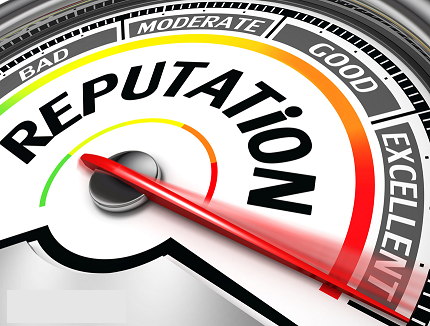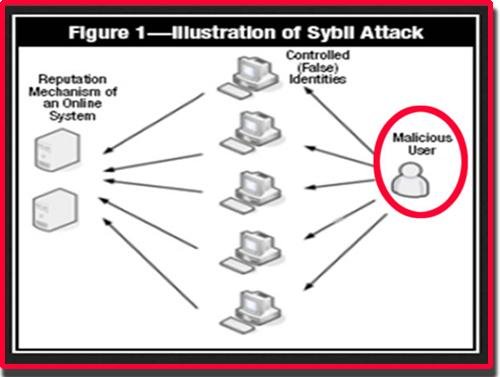
In my last post I spoke of decentralized reputation in very generic and general terms. In this one I'd like to get a little more specific.
For Starters
Let's talk about the value of reputation. In what situations is reputation important? In the context of capitalism I would say reputation is required in order to save the customer either time, money, or both.
People are looking for a way to not get ripped off in a space designed to rip them off. They want to find a high quality service for the lowest price, but at the same time they don't want to spend the time and/or money to figure it out for themselves.
Products (Money)
If you shop on Amazon you might look for products that have a five star review. Theoretically (given a perfect reputation system) this saves the customer the time and money of trying to figure out exactly what version of the product is best for them. The reviews give them an idea of what kind of quality they can expect for the price range they are willing to pay.
Cinema (Time)
These days with Netflix, Hulu, Disney Plus, AMC, HBO, Youtube, and everything else, there are thousands upon thousands of hours of content that could never be viewed by a single person. The entertainment industry has exploded exponentially, therefore the need for reputation systems in these areas is higher than ever before.
Currently, services like Netflix use basic AI to try to figure out what their customers might like to watch. Everyone's taste in cinema is different. A documentary on Hillary Clinton might show up as a five star rating on someone profiled as "liberal" and "likes documentaries" while that same documentary would likely show up as one star for everyone living in the deep south.
These reputation systems are totally opaque. You can't see what's going on behind the scenes, but I can tell you for a fact they've made leaps and bounds developing these algorithms because my Netflix profile seems to know me better today than ever before.

Safety
There are even certain situations where reputation could save a person's life. Buying a car with a five-star crash test rating is one such example. Buying a gun that jams easily is another (although obviously much more niche and controversial). Medication is yet another example, and finding a city to live in, a person to go on a date with, and the list goes on and on.
Conclusion
When it really comes down to it, all reputations are a way to vet decisions yet to be made. In effect, we attempt to get advice from people who have already made all the mistakes we are attempting to avoid. It is a process much like technology and biology itself. We attempt to build a better future by filtering out the sub-optimal outcomes of the past. These decisions are as trivial as what movie to watch next and as serious as moving in next to a convicted sex offender.
Why is Decentralized reputation superior?
It's weird to even mention decentralized reputation, because to my knowledge it doesn't even exist yet, but it will. The value is simply too great. Reviews are only as good as the people giving them. Like any skill that can be mastered, most people are bad at it.
They'll give a shit one-star review on a restaurant because they had a bad experience one time without any thought to the average experience. They'll give a one-star review on a CPU they bought because it was randomly defective or they simply installed it incorrectly. They'll give a five star review on a guilty pleasure reality TV show that they know is bad but they just happen to like it for whatever reason.
With centralized reputation systems, you have to trust the corporation to be honest and competent enough to parse out all this information. In a decentralized atmosphere all the information is available to everyone. Anyone would be able to invent their own metrics to not only find the best products and services, but also the best people for the job when it comes to reviewing those products and services. In the end, it is the reputation of the reviewers (consumers) themselves that matters the most, while simultaneously finding a way to connect like-minded individuals with one another.

The drawback here, as with all decentralized services, is that it require a critical mass of adoption to begin to actually become useful. Reaching that critical mass is exceedingly difficult because decentralized products are harder to monetize, giving little incentive for developers to create these review processes in the first place.
Looking at Steem
I still haven't cast a single downvote since HF21. Arguably, I'm just wasting free resources being provided to me to secure the network. On the same note, there are quite a few accounts that I would trust to cast downvotes for me. All of the tools exist here to allow this to happen, but as far as I am aware no such product exists... and even if it did it wouldn't matter until I was made aware of it and everyone who I trust to cast my downvotes. This is the critical mass of adoption I was speaking to earlier.
In order for these reputation systems to get off the ground, they must first be bootstrapped with functionality that doesn't require adoption to be useful. That's a little tricky but I have a few ideas on that front as well. For example, if I created a reputation system that generates a custom feed based on the users I trust and how much I trust them, the value of that requires no network. Features akin to this idea give users a reason to use the product before the mainline network effect actually becomes useful.
Forking Decentralized Rep
So what happens when you trust my movie reviews but don't trust my views on the government or investment advice (or whatever else). The system must be forked to accommodate those views. Unfortunately, this requires even more users to take part of the system in order to be useful. Each fork would have to attain the same level of critical mass adoption as the original product to become useful.
Sybil attack
Whenever I talk about reputation I seem to garner a lot of resistance to the idea because of all the failings of all the reputation systems that came before it. Perhaps I'm being too optimistic, but I feel like you can't compare decentralized reputation systems to centralized ones. Perhaps this argument is moot seeing as there are no decentralized reputation systems in existence yet. There really is no real comparison to be made, yet. However, just like I feel that crypto can't be compared to the dot com bubble so does the same feel true with reputation stored on the blockchain.
At it's core, Bitcoin itself is more of a reputation system than a currency, and its value is doubling exponentially every year. Seeing as no other asset in human history has ever been close to achieving this massive feat, I have to assume I'm on the right track. Clearly, in the context of a reputation system, Bitcoin is the most basic bitch system ever, but perhaps that simplicity will turn out to be more of a feature than a bug. It's obviously very easy to over-complicate things into complete irrelevance in this space.
Example Sybil attack
On a centralized service like Twitter, Facebook, Amazon, Uber, or any other corporation, we have to take into account how difficult it is to create a new account and for that account to give a meaningful review. For the most part, creating a new account is quite trivial, as these companies know easy onboarding is a primary concern. There is very little (if any) KYC process. All you need is an email, and anyone can create any number of free email accounts. As most of us are aware there are even cyber farms full of real people that get hired to game these reputation systems and or generate fake ad revenue. The term 'Chinese Gold Farmer' comes to mind, but then again I was playing World of Warcraft for ten years so perhaps my readers don't identify with that.
In any case, creating a new account on these centralized services is easy, and we have to trust that the corporation itself is going to accurately weed out the fake reviews from all those bogus accounts. No one else has any way of fact checking this assumption, because all the information is locked away on their private servers; a problem that literally can't exist on an open decentralized network.

Example Sybil attack (for real this time)
Bob is selling something. Bob is getting bad reviews because his product is a ripoff and customer service is terrible. Bob has a grand idea. He creates (or pays for) a thousand fake accounts and gives himself all 5 star reviews. He also starts offering users a tiny discount/perk for 5-star reviews. All the five star reviews have now drowned out the average, allowing his product to keep selling despite it's poor quality. This reputation system has been gamed into the dirt and the corporation moderating it is too slow to react to Bob's deception.
Let's say Bob comes to the Steem network and tries to pull the same bullshit. Wow! Those 1000 accounts were even easier to create with a script than the ones on Amazon.com! Suckers! The only problem is, no one's reputation algorithms trust these new bot accounts, so they have absolutely no weight in the system. It's exactly the same concept of accounts with 0 reputation being grayed out on Steemit.com (if only we could assume this reputation was useful).
Because no one with any clout actually trusts Bob's product, he's forced to either abandon our platform or start selling a product that's actually worth the price being paid for it. Take that, Bob!
Drawback
The critical mass of adoption required for a useful decentralized reputation system is even higher than that of a centralized one. Say a dozen highly ranked accounts on Steem trust what I personally have to say and they voice that on the reputation system, this information isn't useful unless someone trusts at least one of those dozen accounts. Rather than trusting a centralized entity we're forced to trust individuals.
At this point the network must be extrapolated and expanded. Perhaps a person doesn't know/trust any of those dozen accounts directly, but indirectly they trust someone who in turn trusts one or more of those accounts. This is obviously worth something, but less than if the reputation was direct.
This also puts the whole system at risk of simply requiring way too much work to operate. It assumes that a lot of people in the network are willing spend time adding value to the system by identifying who they do and do not trust, rather than allowing a single centralized authority with a nifty algorithm to do all the heavy lifting.
However, to me this is the definition of proof-of-brain. If the information can be slightly monetized with blockchain tech this incentivizes a lot more users to do the work that they normally wouldn't do. Imagine a reputation system that becomes so valuable that new coins and tokens start airdropping it directly. A situation like this gives huge incentive for everyone in the network to participate honestly, accurately, and objectively. When your own reputation is worth real money, network effect begins to spiral out of control, just like the value of Bitcoin itself.
Fail post!
Whenever I think about this topic in my head it seems like it should be easy enough to convey the information. However, even after this brick of text I still haven't seemed to get the point across that I was looking for. I suppose this topic is just far more complicated than I give it credit. Here's to hoping I jump back onto the programming train soon and am able to actually produce some tangible results.
This post is so epic i need to read it when im in a quiet place.. I was reading most of Blockchain Revolution, a book which was a great read, it touched on this digital reputation alot, and im very interested in all this. I dont plan to use tech in the future but will obviously have shares in certain cryptos, but with the future when all this data collected starts being used against us, we can have online avatars and accounts, multiple accounts for various tasks, and that ID block would only contain the needed personal data - example, our driving licence shows much more than just our photo and name (which is all thats needed to prove its your licence.)
It could be that our PublicKeys and addresses become our digital ID. anyway im high as shit stood in a punk bar so ill reply again another time 🤣
yeah honestly I think the future of all this is going to turn out quite unpredictably strange.
Amazing that we get to witness it 😐
you can also follow our flagtrailLol! Dude! Join us at @steemflagrewards :D https://discord.gg/dV3EMx